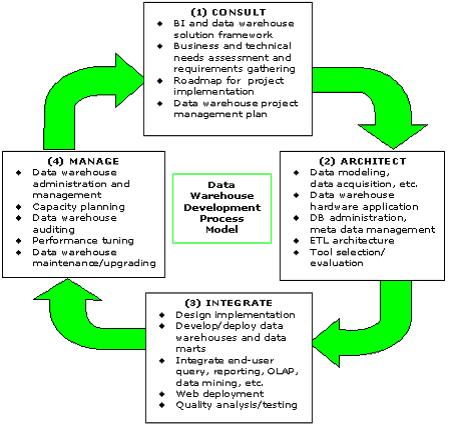IGCL’s Data Warehousing
Services
IGCL's data warehousing services rely heavily
on a data warehouse development process model, which
is the result of experience the group has gained through
successful client engagements and from assimilating
industry best practices. This process model is flexible
and is designed to support incremental and iterative
development. It also encapsulates an onsite/offshore
execution model, which provides a cost benefit to
the client and helps optimize project cycle time by
distributing application development and support between
offshore and onsite development facilities, thereby
enabling "round-the-clock" implementation.
(Onsite/offshore implementation is examined later
in more detail).
As shown in Figure 1, IGCL's process model supports
all aspects of the data warehouse lifecycle. It facilitates
rapid application development and reduces both the
cost and risk associated with data warehouse projects
by providing a proven methodology for scoping data
warehouse project engagements, validating application
design, and identifying products to support the design,
implementation, and upkeep of data warehousing and
BI applications. The process model also supports IGCL
consultants with standard practices for interacting
with clients throughout all stages of the project
lifecycle.
Consult
In this initial consulting and discovery phase, IGCL
consultants work with the client to assess the client's
immediate and long-term data warehousing and BI needs
and to derive an overall plan for delivering the appropriate
application.
A key task involves conducting a business and technical
needs assessment to create a requirements specification.
This includes clearly defining key business issues,
creating a plan for applying BI to resolve them, and
developing an understanding of the scope, business
value, and impact that the proposed solution will
bring the client.
A "road map" detailing how to proceed with
the project is created.
This plan includes recommendations on technical issues
and how to proceed with application development and
delivery, and it provides cost estimates and strategies
for gaining the appropriate business sponsorship and
approval. A data warehouse project management plan
is also created that specifies change control procedures,
considers risk management planning and outlines project
quality insurance guarantees, and analyzes such issues
as what skills will be required to be transferred
to the client to support application maintenance and
upkeep.

Figure 1 -- IGCL data warehouse services development
process model.
As a proof-of-concept, IGCL consultants create
an application prototype, which is demonstrated to
the client -- complete with sample analyses and reports
-- to demonstrate the benefits and value of the solution.
The final deliverable at the end of this phase is
a requirements specification detailing the client's
needs and project deliverables.
Architect
This phase entails creating the logical application
design based on the business and technical requirements
defined in the implementation road map. The goal is
to facilitate a data warehouse/data mart design that
matches the client's business needs with its infrastructure
and architectural requirements.
Key tasks include creating a standard framework for
implementing the necessary data acquisition architecture,
designing the appropriate data models and metadata
repository, and designing the supporting hardware
and software architectures. Particular attention is
paid to data quality issues, with IGCL consultants
typically conducting data quality assessment engagements
with the client. (For this activity, IGCL consultants
rely on IGCL's data quality process model, which
the firm has refined based on findings from repeated
project engagements.) Tool/product selection and evaluation
is also conducted during this stage.
Integrate
This phase consists of implementing the logical design,
in which the overall application is developed and
deployed. Key tasks include building the physical
data warehouse database. The supporting ETL architecture
and end-user BI applications (reporting, OLAP, data
mining models, etc.) are also created and integrated
with the data warehouse and specific data marts. Deployment
is incremental and iterative in order to have the
client realizing benefits quickly from the solution.
Testing and quality assurance is also conducted.
This includes measuring warehouse/tool application
performance and end-user acceptance, with a strong
emphasis placed on satisfying end-user requirements
through proper training and support.
Manage
This phase focuses on data warehouse administration
and management and can consist of a one-time engagement
or an ongoing effort. IGCL offers services that
range from defining procedures for performing standard
data warehouse capacity planning and performance tuning
to assisting clients with support and enhancement
services for scaling up applications and for the ongoing
task of satisfying end-user needs with new analytical
models and reporting functions.